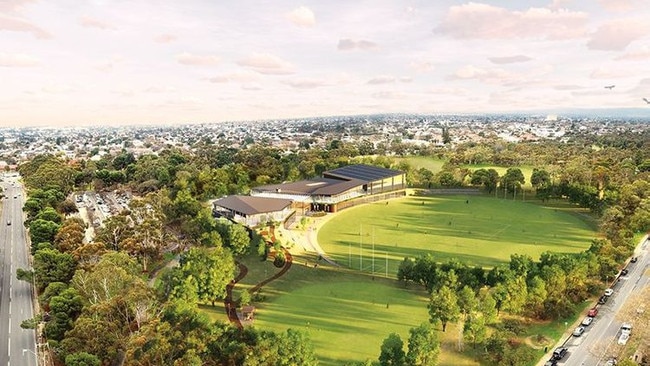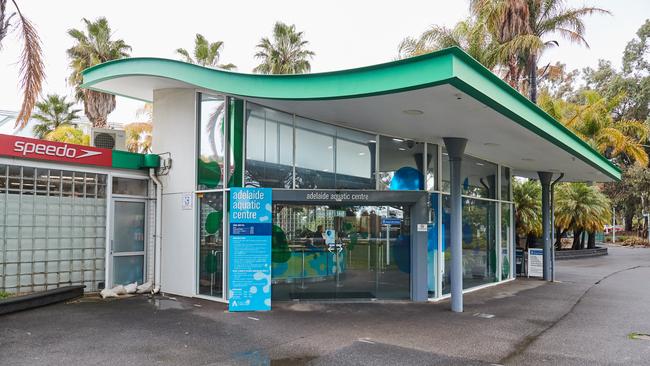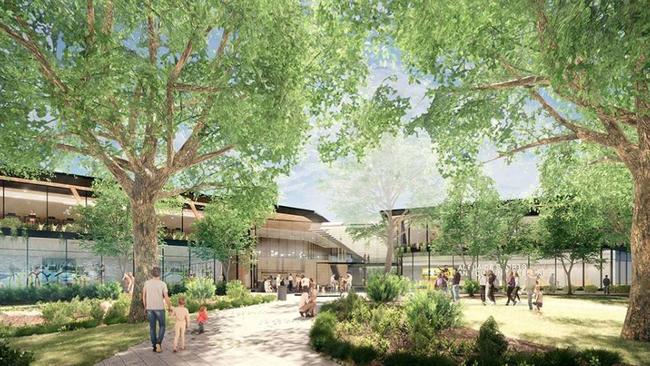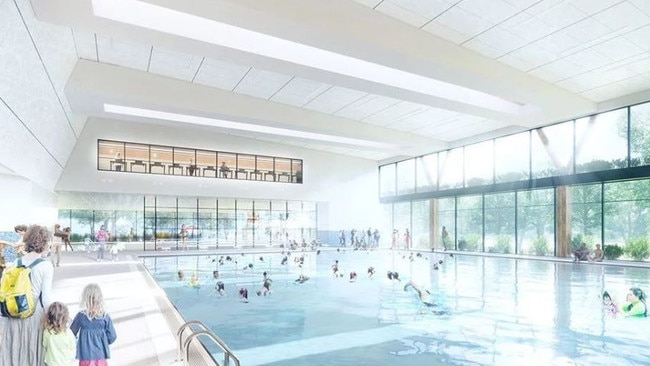Paul Starick: Adelaide Crows’ North Adelaide headquarters must be given green light
The Adelaide Crows’ proposed $65 million sports and community hub at North Adelaide is a simple and overwhelmingly beneficial plan that should be approved in a heartbeat, writes Paul Starick.

Opinion
Don't miss out on the headlines from Opinion. Followed categories will be added to My News.
- Crows reveal Aquatic Centre plans
- Feathers fly as Crows’ HQ plans divide community
- Subscriber exclusive: Win courtside tennis tickets
The Adelaide Crows’ plans for new headquarters at North Adelaide should be backed and embraced without the hysteria that has bedevilled even minor proposals in our state capital.
The proposed $65 million sports and community hub is a simple and overwhelmingly beneficial plan that should be approved in a heartbeat.
The state’s most popular and best-supported AFL club wants to move from West Lakes into the area from which it takes its name. It wants to build a new public swimming pool, along with a training and administration complex, that will reduce the existing, dilapidated, money-draining building’s footprint and, as such, create more green space.

A shrill minority is, as per usual, unleashing erroneously apocalyptic claims that approving the Crows HQ will unleash an array of other commercial developments that will overwhelm the parklands and thus deprive the public of precious green space.
These hackneyed arguments have been used for years, to oppose everything from Adelaide Oval’s magnificent $535 million upgrade to the successful campaign in the past decade to block a permanent grandstand for Victoria Park.
To borrow a phrase from Prime Minister Scott Morrison, it is a reasonable assumption that the quiet South Australians are backing the Crows’ proposal – apart from Port Adelaide supporters, of course.
By 2.30pm on Wednesday, an Advertiser poll of more than 2250 respondents found two-thirds (66 per cent) were in favour of giving the Crows’ proposal for the Adelaide Aquatic Centre the green light, compared to 27 per cent opposing, 5 per cent wanting more options and 2 per cent undecided.
Even the shrill opponents, spearheaded by the well-meaning and passionate Adelaide Park Lands Preservation Association, are confused about the basis for their outrage.
Some of the crippling North Adelaide conservative establishment oppose the Crows’ plan, fearing it will open up their haven to everyday people. But this same constituency has been happy to deny public access to parklands in their front yards. For years, a group of well-heeled North Adelaide residents locked an Adelaide City Council-owned grass tennis court, preserving it for the exclusive use of a small clique until the cosy arrangement was exposed by The Advertiser.
Adelaide Crows chief executive officer Andrew Fagan this morning hinted on ABC Radio that the club was planning some activities or operations at the long-dormant former Le Cornu site, where Adelaide-based Commercial & General was last month chosen by the Adelaide City Council to breathe new life into the empty land at 88 O’Connell St. This is the same firm that is transforming the Football Park precinct, where the Crows have been based since 1991, as part of the WEST residential and commercial redevelopment.
O’Connell St has spluttered along for years, hampered for more than 30 years by a giant empty block at the former Le Cornu site.

The Crows should lend the muscle that only the state’s most supported and passionate fan base can deliver to help spur the site’s redevelopment.
Mr Fagan and Adelaide chairman Rob Chapman have, rightly, spoken of the potential for an influx of Crows fans to breathe life into North Adelaide’s economy.
But the Adelaide Football Club will have to be more engaging and transparent now plans have been released than it was in the lead-up to last night’s Adelaide City Council meeting.
The Crows cannot rely on their large fan base to slavishly back the case for North Adelaide. Until now, the club focused on the politics of convincing council elected members, seemingly with varied results. As the Crows have been firmly reminded in recent months, an unelected board cannot impose its will on supporters.
A successful shift to North Adelaide is critical to the club’s long-term future and, as such, the ability of Crows officials to successfully engage council members, fans and politicians alike will be tested.
The proposal for a new training base to replace the 34-year-old aquatic centre should be a no-brainer. But the relentless opposition to change from some sectors of Adelaide guarantees it will be complicated.
With this in mind, it is worth revisiting the prescient 2003 report of Adelaide thinker in residence Charles Landry, an international authority on city futures.

Called Rethinking Adelaide – Capturing Imagination, Mr Landry’s report argued Adelaide must recognise it was in a “crisis’’ of decline.
“Too many people are still coasting. There is a danger of nostalgia about all good things past,’’ Mr Landry argued.
Adelaide had “a tendency to be self-satisfied, introverted and defensively positive about itself”.
“Adelaide is a city that speaks far more passionately about the negatives rather than celebrating achievement,’’ Mr Landry argued.
Colonel William Light’s plan of the city and parklands “stands as the supreme emblem’’ of a “preference for order and perfectionism’’. Mr Landry argued there were “deep-seated, urgent implications’’ of Adelaide’s psychology, pointing out that quality of life would be “sustained only if there is also wealth creation and entrepreneurialism at every level’’.
“Our current era demands that cities are open to the world, alert, willing to foster creativity on a continual basis,’’ he said. Adelaide needed to “learn to be a city’’, he said, “and think on a bigger scale by moving away from town thinking’’.
The most critical aspect of this was becoming decisive. Mr Landry argued: “Adelaide needs to become a ‘yes’ city rather than a ‘maybe’ city. Even a ‘no’ city is better than ‘maybe’, because at least a decision has been made which gives certainty.’’
In the Adelaide Crows’ case, there really is only one answer that a world-class city would deliver to whether this relatively small-scale project should go ahead. It must be yes.
– Paul Starick is an Adelaide Football Club foundation member.

